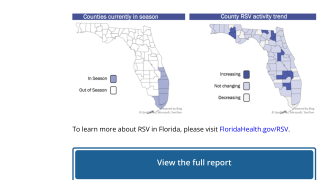Skin Vaccination Using Microneedle Patch May Protect Against Respiratory Syncytial Virus

According to a new mice study, using a microneedle patch delivery has been found to enhance protection against the Respiratory Syncytial Virus (RSV) and reduce inflammation in the body after exposure to the virus.
This non-human research led by Georgia State University is important since there are no approved vaccines to protect people against RSV.
RSV is a common respiratory disease, but it can be serious for young children, patients with compromised immune systems and elderly people, says the Centers for Disease Control and Prevention (CDC).
For children in the USA under 1-year-old, RSV is the most common cause of bronchiolitis, inflammation of the small airways in the lungs and pneumonia.
Each year in the U.S., the disease is responsible for 57,527 hospitalizations among children younger than 5 years old, 177,000 hospitalizations among adults older than 65 years old and 14,000 deaths among adults older than 65 years old, according to the CDC.
In this study, the researchers tested microneedle patch delivery of the FI-RSV vaccine with and without an adjuvant, a substance that enhances the body’s immune response to foreign particles, called monophosphoryl lipid A.
The addition of the adjuvant to the microneedle patch significantly increased the vaccine’s ability to induce an immune response, clear the virus from the lungs of mice and prevent RSV inflammatory disease.
Delivery of RSV vaccines to the skin via a microneedle patch would be highly attractive for children who have needle-phobia of intramuscular needle injection, said these researchers.
Recent RSV vaccine candidate news:
- RSV Vaccine Clinical Trial Launched by Cincinnati Children’s Hospital
- RSV Vaccine Candidate Intends to Increase Neutralizing Antibody Levels in Pregnant Women
- RSV Vaccine Candidate Passes Phase 2 Study
Microneedle patches contain micron-scale, solid needles that are coated with vaccines in a dry formulation, which can be applied to the skin as a patch, and administered by minimally trained personnel.
Also, microneedle patch vaccination would induce a different profile of immune responses that could be more effective in preventing RSV vaccine-enhanced disease due to targeted skin dendritic cells.
“Skin delivery of RSV vaccines with an appropriate adjuvant can be translational to the clinic,” said Dr. Sang-Moo Kang, senior author of the study and professor in the Institute for Biomedical Sciences at Georgia State, in a press release.
This study provides evidence that different routes of RSV vaccine delivery may impact the efficacy and vaccine safety.
Co-authors of the study include Soojin Park, Youri Lee, Young-Man Kwon, Young-Tae Lee, Ki-Hye Kim and Eun-Ju Ko of Georgia State; Jae Hwan Jung and Prausnitz of the Georgia Institute of Technology; Manki Song of the International Vaccine Institute in Seoul, Korea; and Barney Graham of the National Institute of Infectious Diseases of the National Institutes of Health.
The microneedle patch was developed by Dr. Mark Prausnitz of the Georgia Institute of Technology.
The study was part of a National Institutes of the Health-funded collaboration project with Georgia State as a host institute and Kang as a principal investigator.
Our Trust Standards: Medical Advisory Committee
- Vaccination by microneedle patch with inactivated respiratory syncytial virus and monophosphoryl lipid A enhances the protective
- Vaccine Using Microneedle Patch With RSV Virus, Immune-Stimulating Compound Is Effective Against RSV
- RSV in Infants and Young Children
- Brief History and Characterization of Enhanced Respiratory Syncytial Virus Disease


























